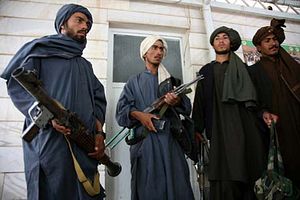Ahmed Rashid is one of few writers who explained the Taliban phenomenon to the rest of the world in the late 1990s. His book Taliban: Militant Islam, Oil and Fundamentalism in Central Asia was a sensation and became a universal success, being translated into more than 40 languages and undergoing several reprints. Another book, Descent Into Chaos, captured the chaos facing Afghanistan and how the country is on the brink of failure. An authority on South Asia, Rashid has been a keen observer of the region since the 1980s, both as a journalist and a writer.
Today, the Taliban remains closed off to the overtures being made by the Quadrilateral Coordination Group (QCG), a grouping comprising the Afghan government, the United States, China, and Pakistan. The Diplomat’s Sanjay Kumar spoke with Rashid recently about the challenges for the Afghan peace process in 2016.
The Diplomat: Why is the Taliban not keen to come to the negotiating table?
Ahmed Rashid: I think they have had so many battlefield successes in the last months that they are feeling confident in pursuing the military line. The other reason is that they are badly fragmented and divided, and Mullah Mansoor does not want to create more divisions within the Taliban at the moment by entering into the talks. There is a peace lobby within the Taliban, but there is also a war lobby. The Taliban is also faced with fragmentation within their ranks; they are fighting [the Islamic State], which is trying to encroach upon their manpower and recruit Taliban fighters. Also, although they are dependent on Pakistan, they are also at odds with Pakistan, which is trying to bring them to the negotiating table.
You mean to say that the reluctance of the Taliban to join the peace process also demonstrates Pakistan’s limitations vis-a-vis the group?
I feel that there should have been more pressure exerted earlier on last year after the Murree talks, especially on the leadership of the insurgent group, a majority of whom are living in Pakistan. I think that pressure is now being applied by Pakistan, but it’s coming after their victories in Helmand and Kunduz. It is very late for Islamabad to be doing this.
What are the consequences for Pakistan?
Well, Pakistan must find a way to end the war in Afghanistan. I think that is absolutely significant and, most importantly, they should find a way to reduce violence in Afghanistan and persuade the Taliban and the government in Kabul to move towards a ceasefire. I think another problem is the government in Kabul is very weak. It has not been able to carry out many of the reforms it was supposed to enact. We have seen major divisions between the opposition politicians, warlords, and the government under President Ashraf Ghani.
Will a failure in talks reflect badly on Afghanistan and its government?
Of course. I think President Ghani has staked a great deal by going through Pakistan and trying to attract Taliban toward talks. This policy is very controversial in Afghanistan. There are lots of Afghan politicians who are opposed to this approach and they still feel that Pakistan is playing the old game of deception, which I think is not true. There is a lot of opposition inside Kabul in trying to go through Pakistan. Clearly it is very important that Pakistan helps deliver something to Ghani so that he would be strengthened domestically. He is close to Pakistan and is trying to get Islamabad to bring the Taliban to the table. The next Afghan president might not follow this approach.
What is China’s involvement in the talks?
I think China is playing a very positive role. Both China and the United States are working together; they both want peace for Afghanistan. China’s promise of massive investment in infrastructure in Pakistan and Afghanistan is very good too; it is an important carrot for both Afghans and Pakistanis. China is not playing a diplomatic role exclusively, but is also offering major economic sustenance to both countries.
How far is stability in South Asia dependent on the success of these talks?
Afghanistan is at the center of terrorism and extremism and now we are seeing the presence of ISIS, which is dangerous. Clearly, until peace in Afghanistan prevails, the threat of terrorism is going to continue for the broader region. This, of course, is not good for stability.
This interview has been edited and condensed.

































